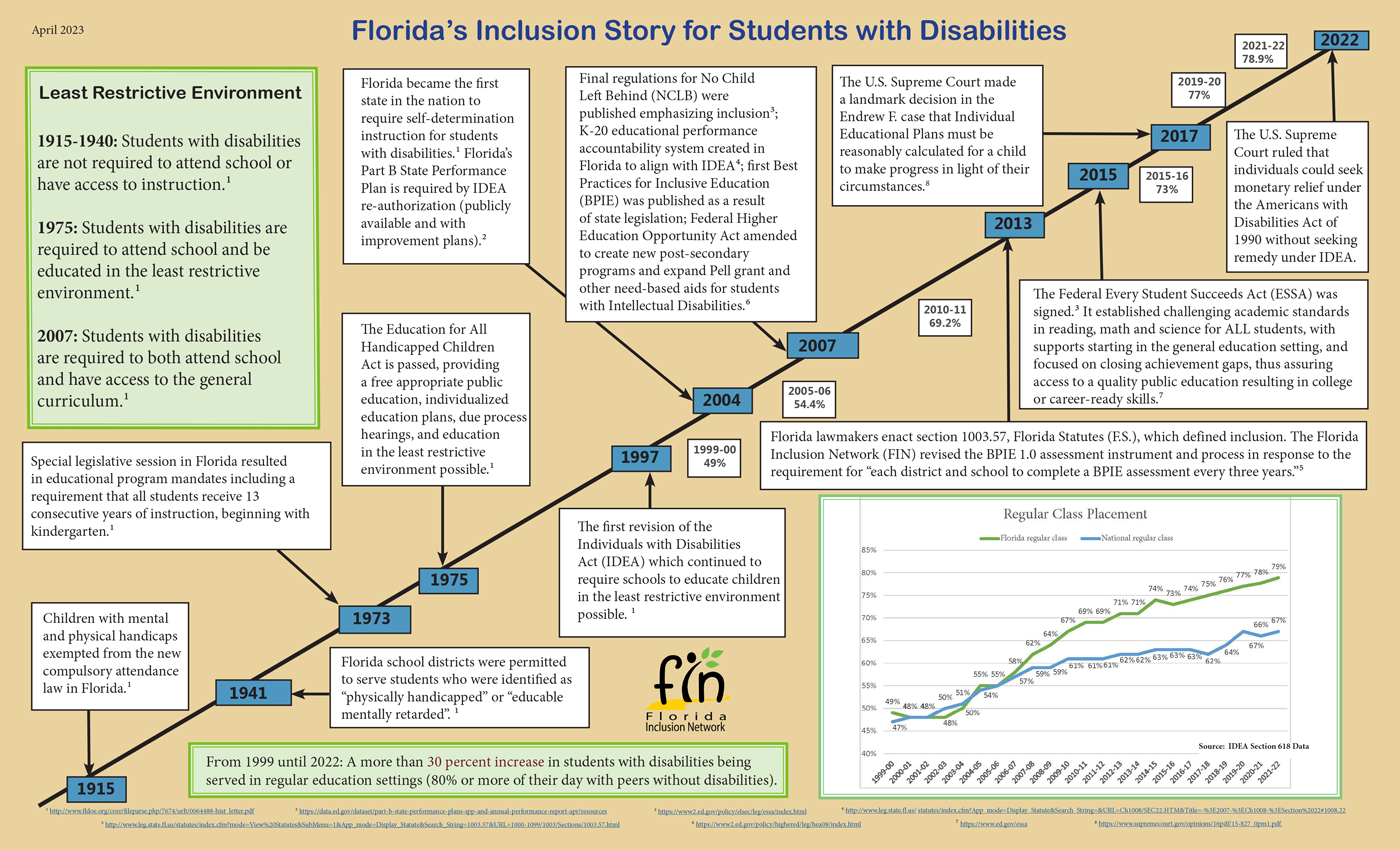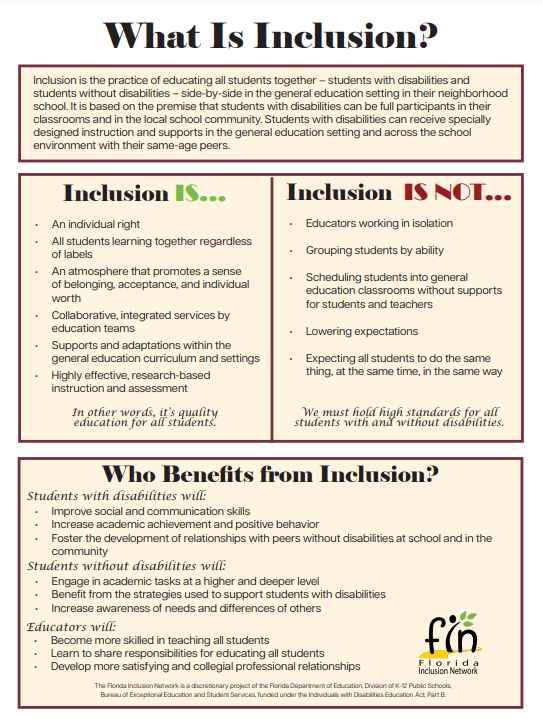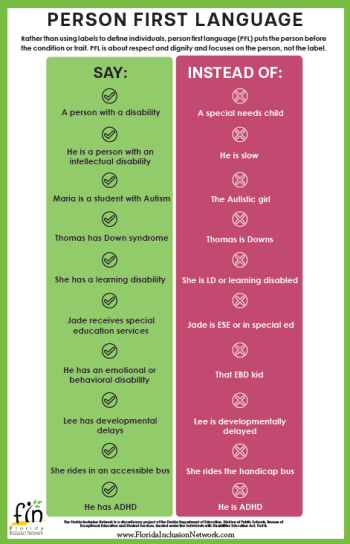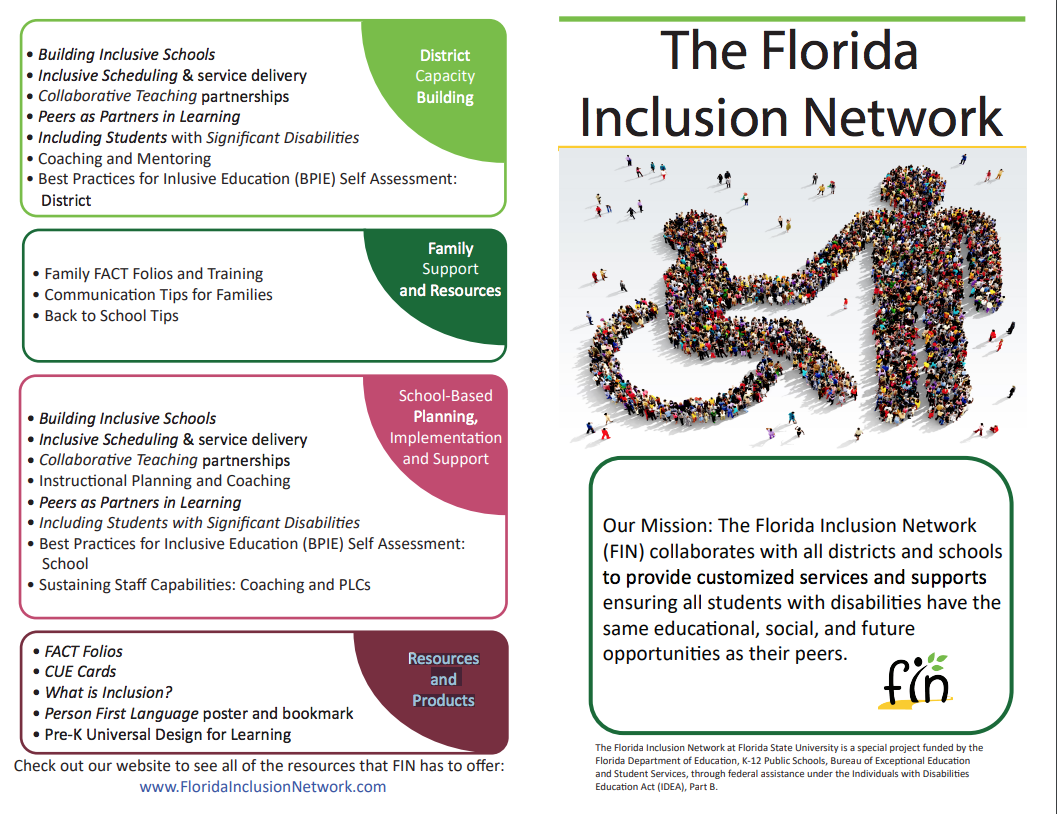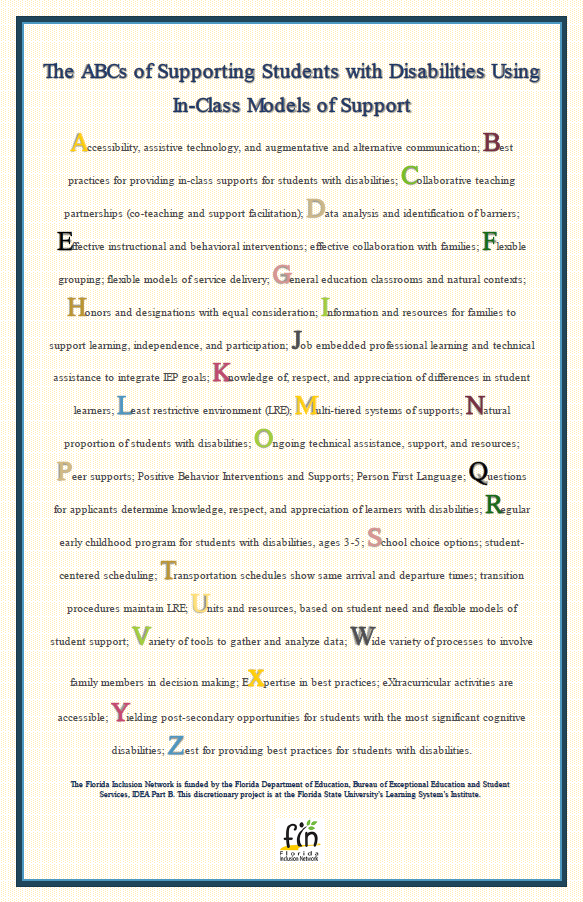
Core Principles of Inclusion
Inclusion isn’t something that you “do.” It’s a belief. It’s an individual right, especially for students with disabilities. It is reflected in the culture of a school , and it involves basic principles such as presuming competence and making the least dangerous assumption. It is a set of everyday practices that result in positive student outcomes and it has benefits for students with and without disabilities, teachers, administrators and families. Use and share the resources on this page to learn and start discussions about the core principles of inclusion.
What is Inclusion?
An overview of the foundations of inclusion, with essential concepts and frameworks needed to promote an inclusive school culture.
Building Inclusive Schools module
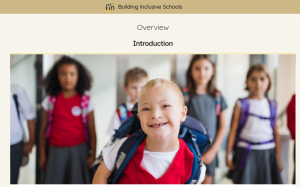 Building Inclusive Schools (BIS) is a 10-hour independent study course that provides information to assist district and school administrators, teachers, and other stakeholders in creating and supporting an inclusive school culture for all students. Units lead participants through a brief viewing of disability history, establishing a vision and processes for an inclusive school culture, focusing on the components of universal education, and implementing specially designed instruction and individual supports so that all students with disabilities exit school as college, career, and life ready.
Building Inclusive Schools (BIS) is a 10-hour independent study course that provides information to assist district and school administrators, teachers, and other stakeholders in creating and supporting an inclusive school culture for all students. Units lead participants through a brief viewing of disability history, establishing a vision and processes for an inclusive school culture, focusing on the components of universal education, and implementing specially designed instruction and individual supports so that all students with disabilities exit school as college, career, and life ready.
The Building Inclusive Schools 10-hour independent study course can be viewed at: https://fl-pda.org/#/home under Independent Courses.
Click here to access a version of this Person First Language poster in bookmark form
FIN Services and Resources
An overview of the services and resources FIN offers for districts, schools, and families.
The ABCs of Supporting Students with Disabilities
Myths and Facts
- The judge deciding the case of Oberti v. Board of Education of the Borough of Clementon (1993) opined that “Inclusion is a right, not a privilege for a select few.”
- Including students with disabilities in general education settings sends a message of belonging, which benefits the well-being of students and creates a culture of acceptance and belonging. More than 40 years of research supports inclusive best practices for students with disabilities.
- If schools can successfully educate a student who has disabilities in a general education classroom with peers who do not have disabilities, then the school must offer that educational experience.
- Teachers find that using the principles of Universal Design for Learning (UDL) is the best way to meet the needs not only of students with disabilities, but also of students who come to school with vastly different life experiences, who speak many different languages, who have diverse strengths and needs, and who need creative ways to “show what they know.”
(Source: https://www.understood.org/articles/universal-design-for-learning-what-it-is-and-how-it-works)
- In Florida, all schools receive basic student allocations. Districts get additional federal funding for special education programs.
- Federal funding doesn’t pay for everything, but it helps to ensure that only a small part of the local school budget goes to special education.
Source: section 300.701 of Title 34, Code of Federal Regulations (C.F.R.)
- For teachers who don’t have firsthand experience with special education, it’s natural to worry that they won’t be able to meet a student’s needs. Professional learning sessions can provide additional tools for teachers to meet the needs of all students.
- The student’s special education teacher and families can help with ways to provide support. Understanding the Individual Education Plan (IEP) is key.
- Collaboration amongst the adults in a student’s life will help align priorities and strategies with providing services to students.
- Providing access to the general education setting is not just for “some” children or for “some” disabilities; access is a right afforded to all children.
- Being included is not something that a child must be “ready” for or something that must be earned.
- Supporting students with disabilities in their natural contexts is about looking at the ways our schools, classrooms, programs and lessons are designed so that all children can participate and learn.
- Removal of children from the “regular education environment” occurs only when the nature or severity of the disability is such that education in the regular classes with the use of supplementary aids and services cannot be achieved satisfactorily. (Chapter 33ii, Section 1412 (a)(5), S. 39.0016, C.F.R.)
- The Every Student Succeeds Act holds a high expectation for success of all students and states that schools must address the needs of students who struggle.
- A focus on Universal Design for Learning and Differentiated Instruction creates a solid foundation for all students allowing students with disabilities to be included and receive the supports that they need.
- Best practices to support students with disabilities enhance, individualize, and tailor lessons and learning. When educators use these strategies in their lesson planning, there is no need to lower expectations.
- Research has found that the performance of students without disabilities is not compromised by the presence of students with disabilities in their classrooms.
- When schools embrace inclusive education, they find that the achievement of all students improves.
- Children often are more efficient in teaching other children than teachers, and the opportunity to do so reinforces concepts for students teaching them.
- In addition, many of the practices that benefit SWDs also benefit ALL students of diverse backgrounds and needs.
- The Individuals with Disabilities Education Act (IDEA) mandates placement in the least restrictive environment (beginning with the child’s general education classroom in the neighborhood school) that is most appropriate for all students on a case-by-case basis.
- Providing access to the general education setting means that students with disabilities are educated primarily in regular classrooms with their peers without disabilities.
- Students with disabilities can receive their services across educational environments to address their specific needs as indicated on their IEP.
- For example, a student may receive specially designed instruction in another location rather than in the regular class setting.
- Inclusion, per section 1003.57, Florida Statutes (F. S.) definition, is not a specific model of teaching.
- In Florida, the terms “co-teaching,” “inclusion teaching,” and “support facilitation” are used in statute and in the course code directory.
- These terms refer to in-class models of supports for students with disabilities to receive their services. Collaboration is the key.
(Source: https://www.fldoe.org/core/fileparse.php/7746/urlt/CCDNarrative2324.pdf)
- According to Every Student Succeeds Act (ESSA), students with disabilities are general education students first, and held to the same high standards as all students.
- IDEA states that students with disabilities receive instruction in the general education classroom to the maximum extent possible.
- A multi-tiered system of supports is used to provide increasingly intensive instruction for all students.
- Services, or specially designed instruction, can be provided for students with disabilities at any of the three tiers.
- IDEA states that specially designed instruction means:
- “…Adapting, as appropriate to the needs of an eligible child…the content, methodology, or delivery of instruction –
- i). to address the unique needs of the child that result from the child’s disability; and
- ii). to ensure access of the child to the general curriculum, so that the child can meet educational standards within jurisdiction of the public agency that apply to all children.”
Source: 34 C.F.R. § 300.39
- The Individual Educational Plan (IEP) team determines the amount of time (duration), how often (frequency) and where (location) a student receives services. The IEP indicates the amount of time that students with disabilities spend with their peers without disabilities, using a percentage.
- Some students need more support than can be provided in the general education classroom, so schools and districts must offer a range of delivery models based on student needs.
- Most students who receive exceptional student education services are in the same classroom as students who don’t. That’s not just the school’s choice, it’s the way the law says it should be.
- The concept is set forth in the Individuals with Disabilities Education Act (IDEA), and it’s known as “least restrictive environment,” or LRE. More than 40 years of research supports implementation of best practices for including students with disabilities in general education classrooms.
Source: United States Department of Education, 71 Federal Register 46585
- The scheduling process builds the school’s schedule around the needs of students with disabilities.
- In general education classes, flexible grouping is used to provide specially designed instruction (SDI) as well as to support other learners.
- Using a scheduling team, students with disabilities are grouped according to the supports they need, so they can receive their SDI using in-class collaborative models.
- Special education teacher schedules are then developed, followed by the school’s master schedule.
- If we do not address the needs of students with disabilities, we are in violation of IDEA.
- Many students with intellectual disabilities can learn how to read.
- It may take a student with an intellectual disability longer to acquire and master the foundational skills, require specific interventions, or follow different pathways, but reading skills are attainable.
- Students with the most significant cognitive disabilities can access the general education classroom setting when appropriate supports and services are in place.
- Students with extensive supports have historically had higher rates of separate schooling, however, research shows that these students academically benefit, increasing literacy skills, when included alongside their peers without disabilities. (National Council on Disability, 2018)
(Source: TIES Brief 4: Providing Meaningful General Education Curriculum Access
- Not only can students with the most significant cognitive disabilities make academic gains within the general education setting, but there is also a large body of evidence that social skills development, behavior, and many other skills are better-supported while being educated alongside peers without disabilities.
- For students to be successful, teachers and administrators must have knowledge and skills to support best practices for students with disabilities in their natural context.
- A variety of college level programs exist in Florida and around the country for students with intellectual disabilities.
- The Florida Consortium on Inclusive Higher Education works to increase access and engagement in college, with the goal of meeting a chosen career path and obtaining competitive employment.

